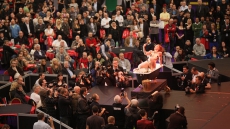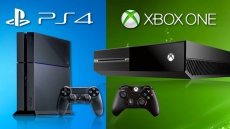ATLANTA — Not all selfies are created equal. Some are blurry, are poorly framed or miss the action entirely because you might be scrubbing your thumb fishing for a virtual shutter button as the moment passes you by.
Although phone manufacturers are trying to help by building in tools for better selfies, many of these have their limits. For better selfies, consider some of these gadgets for yourself or your loved ones.
— Halo/Hisy ($25):
This one is really simple. The Halo is a small plastic button that serves as a wireless shutter trigger for your phone's camera. Its only job is to trigger your phone's shutter when you click the button. One function, one result.

My tests with the Halo for my Android phone went smoothly. The company makes an iPhone version called Hisy. You need to install its free camera app, Shutter Panorama, as neither Halo nor Hisy works with the regular camera app that comes with the phone.
Shutter Panorama doesn't have too many manual settings or special features. But the device does a good job in allowing me to place my phone in places other than my hand. I got some nice shots of myself and my dog by putting the phone against a rock in the front yard and sitting a few feet away. It's more elegant than setting the camera's timer and running to get in the shot.
— Kodak Pixpro SL25 ($300):
The Pixpro SL25 from Kodak is essentially a camera lens that mounts onto your phone, allowing for higher resolution than what your phone's camera can capture. The Pixpro communicates with your phone over Wi-Fi and lets you compose the image on the phone's screen. Once the photos are snapped using the shutter button on the Pixpro, the phone serves primarily to review and share the images to social media services.
The downside is you have a second device to carry around, which defeats the purpose of taking selfies on the fly. The upside is image quality. The Pixpro shoots sharp 16 megapixel photos and full high-definition video at 1080p. This quality is common for rear cameras, but not the front ones for selfies.

The Pixpro has fold-out arms to attach to my phone, such that the two devices act as one. That, in itself, isn't different from using just the phone for selfies. But I was able to hold the Pixpro and press the shutter in ways I could not with my phone. For instance, I was able to have my finger rest on a physical button on the Pixpro instead of searching on the phone's touch screen for a virtual one.
I had a lot of success using the Pixpro unattached to my phone as well. It has a wide-angle lens that fits plenty of action into the frame.
Some phones are coming with better front cameras. The one on HTC's new Desire Eye is 13 megapixels, the same as the rear camera. There's even a front flash. You'll still get sharper images with the Kodak attachment.
— Satechi Smart Selfie Extension Arm Monopod ($50):
This telescoping monopod from Satechi helps get more than just yourself in the frame. Similar to the Kodak unit, this monopod has spring-loaded rubber pieces that grip the phone on its sides, holding it firmly in place. From there, you simply extend the telescoping device out to its full three feet and get lots of buddies or surroundings into the shot.
What really helps is that a shutter button on the grip of the pole connects to your phone via Bluetooth, allowing you to snap the selfie without reaching up to the phone. Once I paired the monopod to my phone and launched my default camera app, I was able to easily snap various selfies with a birds-eye view and other vantage points longer than my arm.

The Satechi unit worked fine with my phone's default camera, but not with other camera apps I enjoy, such as FxCamera and Candy Camera.
Samsung's new Galaxy Note models do let you fit more people in by stitching multiple images together. You tilt the phone left and right, and the Note's software does the magic behind the scenes. The shot won't be as instant, though, as what the monopod can provide.





